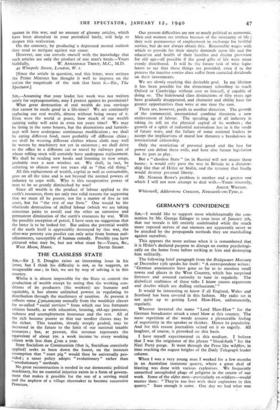THE CLASSLESS STATE
SIR,—Sir J. S. Douglas raises an interesting issue in his letter, but I think his difficulty is not, as he suggests, an insuperable one ; in fact, we are by way of solving it in this country.
Whilst it is almost impossible for the State to control the production of wealth except by seeing that the working con- ditions of its producers (the workers) are humane and equitable, it has almost unlimited powers in regulating its distribution through the machinery of taxation. At present it collects some L300,000,000 annually from the wealthier classes for so-called " social services " from which our less fortunate citizens benefit, as with education, housing, old-age pensions, sickness and unemployment insurance and the rest. All of the rich become poorer so that our needier classes may be the richer. This taxation, already steeply graded, may be increased in the future to the limit of our national taxable resources ; but, at present, this revenue represents the equivalent of about los. a week income 'to every working citizen with less than £roo a year.
State Socialism or Communism (that is, Socialism coercively applied) seeks to burn down the house, on the insecure assumption that " roast pig " would then be universally pro- vided ; a saner policy adopts " evolutionary " rather than " revolutionary " methods.
No great reconstruction is needed in our democratic political machinery, for no essential injustice exists in a form of govern- ment that makes it possible for the son of a serving maid and the nephew of a village shoemaker to become successive Premiers.
Our present difficulties are not so much political as economic. Men and women are restless because of the insecurity of life ; they seek permanence of employment in exchange for faithful service, but do not always obtain this. Reasonable wages with which to . provide for their simple demands upon life and the education and health of their families and decent provision for old age—all possible if the good gifts of life were more evenly distributed. It will be the future task of wise legis- lators to see that these things are provided, even if in the process the inactive render class suffer from curtailed dividends on their investments.
We are slowly reaching this desirable goal. In my lifetime it has been possible for the elementary schoolboy to reach Oxford or Cambridge without cost to himself, if capable of doing so. The hidebound class distinctions of fifty years ago have gradually disappeared, and character and ability have far greater opportunities than were at one time the case.
There are, however, perils in another direction. The growth of the commercial, international combine threatens a new enslavement of labour. The speeding up of all industry is taking its toll on the physical capital of its workers ; the growth of a spirit of industrial nationalism has in it the seeds of future wars, and the failure of some national leaders to accept the implications of moral law threaten a breakdown in international citizenship.
Only the restriction of personal greed and the lust for power can defeat these evils, and here also future legislation has its part to play.
But a " classless State " (as in Russia) will not secure these boons : it would only pave the way in Britain to a dictator- ship like that of Hitler or Stalin, and the tyranny that finally would destroy personal liberty.
Mr. Newton Rowe's problem is another and a greater one which I will not now attempt to deal with.—Yours sincerely,
ANGUS WATSON.
Whitewell, Adderstone Crescent, Newcastle-on-Tyne, 2.


































 Previous page
Previous page